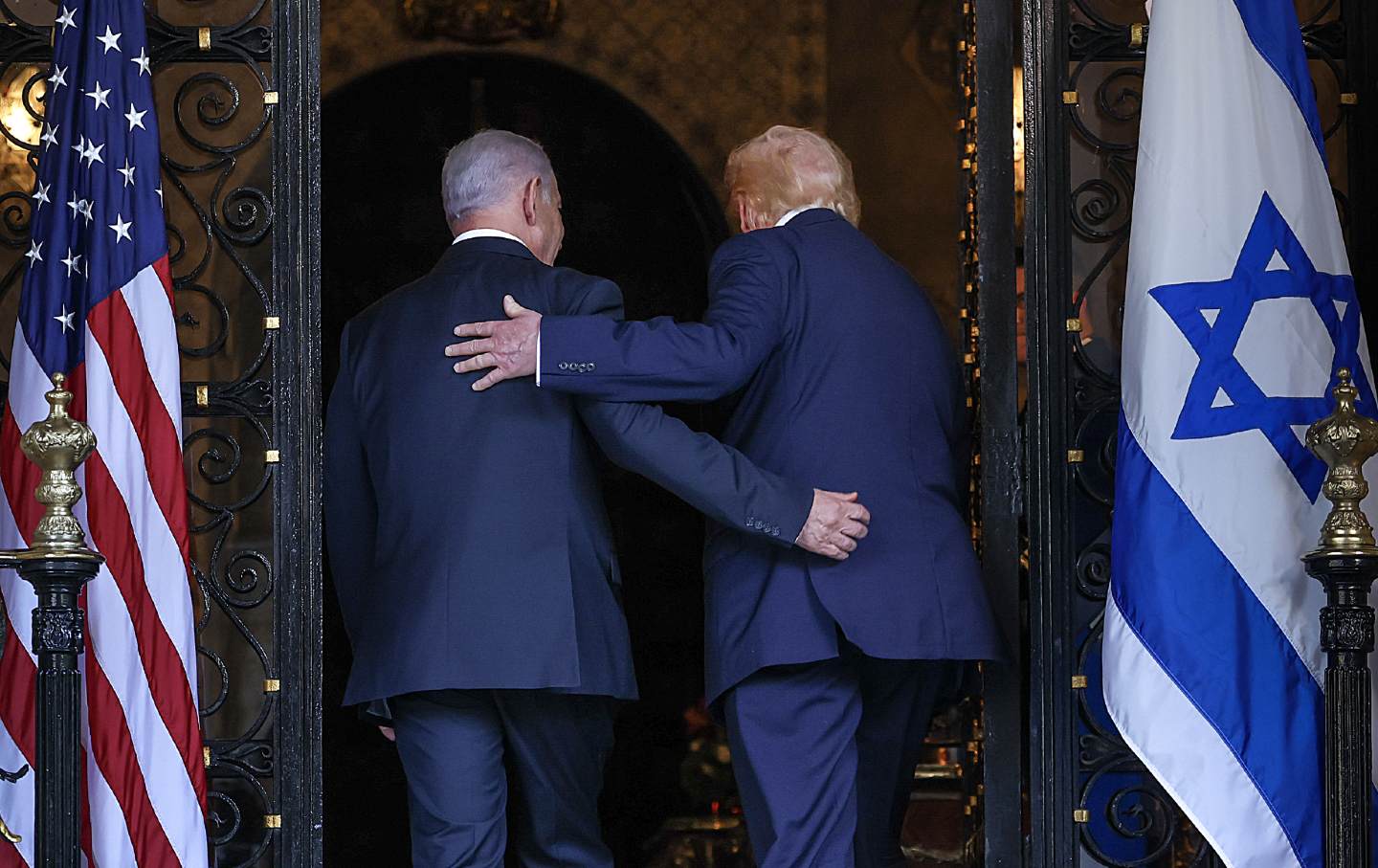
Benjamin Netanyahu in Jerusalem on February 5, 2024.
(Gil Cohen-Magen / Pool /AFP via Getty Images)The American decision not to veto a UN Security Council resolution demanding an immediate cease-fire in Gaza—the first time since the beginning of the war that it had allowed such a resolution to pass—sent shock waves through Israel. Benjamin Netanyahu’s subsequent cancellation of a planned Israeli meeting with the Biden government in Washington only heightened the impression that Israel had been left isolated in the international arena and that Netanyahu was jeopardizing the country’s most important asset—its alliance with the United States.
Yet, though there was widespread criticism of Netanyahu’s handling of these sensitive issues, even his opponents—both in the “liberal” camp and on the moderate right—were unanimous in their rejection of the UN vote. Yair Lapid, head of the opposition Yesh Atid party, said that the resolution was “dangerous, unfair, and Israel will not accept it.” Minister Hili Tropper, a close ally of Netanyahu’s rival Benny Gantz—who polls show would win handily if an election were held today—said, “The war must not stop.” These comments did not differ greatly from the angry reactions by extreme-right leaders such as Bezalel Smotrich or Itamar Ben Gvir.
This near-unanimous rejection of a cease-fire mirrors the cross-party support for an invasion of Rafah, even though Netanyahu does not claim that the operation will achieve the long-awaited “total victory he has promised.
The opposition to a cease-fire may seem strange to some. Many Israelis accept the claim that Netanyahu is continuing the war to further his political and personal interests. The families of the Israeli hostages, for instance, are growing more critical of Netanyahu’s “foot-dragging” and amplifying their calls for a “deal now.”.
Even within the security establishment, more people are openly saying that “eliminating Hamas” is not an achievable goal. “[T]o say that one day there will be a complete victory in Gaza—this is a complete lie,” former IDF spokesman Ronen Manelis recently said. “Israel cannot completely eliminate Hamas in an operation that lasts only a few months.”
So if the view that Netanyahu is continuing the war for personal interests is growing; if the futility of continuing the war is becoming clearer, with regard to both toppling Hamas and releasing the hostages; if it is becoming obvious that continuing the war is liable to damage relations with the United States—how can one explain the consensus in Israel around the “danger” of a cease-fire?
One explanation is the trauma inflicted by Hamas’s October 7 massacre. Many Israelis tell themselves that, as long as Hamas exists and commands popular support, there is no alternative to war. A second explanation involves Netanyahu’s undeniable rhetorical talent, which, despite his political weakness, has succeeded in instilling the slogan of “total victory” even among those who do not believe a word he speaks, and those who understand, consciously or unconsciously, that this victory is not possible.
But there is another explanation. Until October 6, the consensus among the Jewish-Israeli public was that the “Palestinian issue” should not bother them too much. October 7 shattered this myth. The “Palestinian issue” returned, in full, bloody force, to the agenda.
There were two ostensible responses to the destruction of this status quo: a political arrangement that genuinely recognized the presence of another people in this land and their right to a life of dignity and freedom, or a war of extinction against the enemy beyond the wall. The Jewish public, which never really internalized the first option, chose the second.
In this light, the very idea of a cease-fire seems threatening. It would force the Jewish public to recognize that the goals presented by Netanyahu and the army—”toppling Hamas” and releasing the hostages through military pressure—were simply unrealistic. The public would have to concede what may be perceived as a failure, even a defeat, in the face of Hamas. After the trauma and humiliation of October 7, it is hard for many to swallow such a defeat.
But there is a deeper threat. A cease-fire could force the Jewish public to confront more fundamental questions. If the status quo does not work, and a constant war with the Palestinians cannot achieve the desired victory, then what remains is the truth: that the only way for Jews to live in security is through a political compromise that respects the rights of the Palestinians.
The complete rejection of the cease-fire and its portrayal as a threat to Israel shows that we are far from the acknowledgment of that truth. But strangely, we may also be closer than people think. In 1992, when Israelis were forced to choose between a rift with the United States—due to then-Prime Minister Yitzhak Shamir’s refusal to agree to the outline presented by the Americans for talks with the Palestinians—or mending the rift, they chose the second option. Yitzhak Rabin was elected prime minister and, a year later, the Oslo Accords were signed.
Popular
“swipe left below to view more authors”Swipe →Will the current rift with the American administration convince Israeli Jews to abandon the idea of perpetual war and agree to give a chance to political deal with the Palestinians? It’s very unclear. But what is certain is that Israel is rapidly approaching a junction where it will have to choose: toward a cease-fire and the possibility of dialogue with the Palestinians, or a war with no end and international isolation the likes of which it has never known. Because the option of going backwards, to the status quo of October 6, is clearly impossible.
Support independent journalism that does not fall in line
Even before February 28, the reasons for Donald Trump’s imploding approval rating were abundantly clear: untrammeled corruption and personal enrichment to the tune of billions of dollars during an affordability crisis, a foreign policy guided only by his own derelict sense of morality, and the deployment of a murderous campaign of occupation, detention, and deportation on American streets.
Now an undeclared, unauthorized, unpopular, and unconstitutional war of aggression against Iran has spread like wildfire through the region and into Europe. A new “forever war”—with an ever-increasing likelihood of American troops on the ground—may very well be upon us.
As we’ve seen over and over, this administration uses lies, misdirection, and attempts to flood the zone to justify its abuses of power at home and abroad. Just as Trump, Marco Rubio, and Pete Hegseth offer erratic and contradictory rationales for the attacks on Iran, the administration is also spreading the lie that the upcoming midterm elections are under threat from noncitizens on voter rolls. When these lies go unchecked, they become the basis for further authoritarian encroachment and war.
In these dark times, independent journalism is uniquely able to uncover the falsehoods that threaten our republic—and civilians around the world—and shine a bright light on the truth.
The Nation’s experienced team of writers, editors, and fact-checkers understands the scale of what we’re up against and the urgency with which we have to act. That’s why we’re publishing critical reporting and analysis of the war on Iran, ICE violence at home, new forms of voter suppression emerging in the courts, and much more.
But this journalism is possible only with your support.
This March, The Nation needs to raise $50,000 to ensure that we have the resources for reporting and analysis that sets the record straight and empowers people of conscience to organize. Will you donate today?
More from The Nation

Trump and His Soulless Cronies Have Managed to Suck the Joy Out of the World Cup Trump and His Soulless Cronies Have Managed to Suck the Joy Out of the World Cup
Not even soccer is immune from Trump’s reverse Midas touch.

Garbage In, Carnage Out Garbage In, Carnage Out
The harrowing lessons of the Pentagon’s recently dissolved partnership with Anthropic.

The Iran War Could Be Catastrophic for the US-Israel Alliance. Good. The Iran War Could Be Catastrophic for the US-Israel Alliance. Good.
As Israel’s role in pushing the war with Iran comes into ever sharper focus, it’s up to us to turn outrage into change.

An Unlawful War An Unlawful War
The precedent being set by the US in launching this war of aggression against Iran will long live in infamy.

Trump and Netanyahu Want to Turn Iran Into a Failed State Trump and Netanyahu Want to Turn Iran Into a Failed State
This war looks designed to cause maximum chaos and instability. The world will pay a high price.

The War on Terror Paved the Way for Trump’s Rise—Now He’s Making It His Own The War on Terror Paved the Way for Trump’s Rise—Now He’s Making It His Own
Only the total abolition of the DHS can restore freedom.


